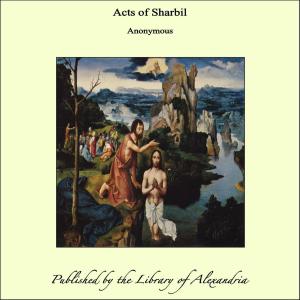| Author: | Andrew Lang | ISBN: | 9781613102404 |
| Publisher: | Library of Alexandria | Publication: | March 8, 2015 |
| Imprint: | Language: | English |
| Author: | Andrew Lang |
| ISBN: | 9781613102404 |
| Publisher: | Library of Alexandria |
| Publication: | March 8, 2015 |
| Imprint: | |
| Language: | English |
Instances perpetually occur in the Sagas: Grettir, Egil, Skarphedin, are always singing. InKidnapped, Mr. Stevenson introduces “The Song of the Sword of Alan,” a fine example of Celtic practice: words and air are beaten out together, in the heat of victory. In the same way, the women sang improvised dirges, like Helen; lullabies, like the lullaby of Danae in Simonides, and flower songs, as in modern Italy. Every function of life, war, agriculture, the chase, had its appropriate magical and mimetic dance and song, as in Finland, among Red Indians, and among Australian blacks. “The deeds of men” were chanted by heroes, as by Achilles; stories were told in alternate verse and prose; girls, like Homer’s Nausicaa, accompanied dance and ball play, priests and medicine-men accompanied rites and magical ceremonies by songs. These practices are world-wide, and world-old. The thoroughly popular songs, thus evolved, became the rude material of a professional class of minstrels, when these arose, as in the heroic age of Greece. A minstrel might be attached to a Court, or a noble; or he might go wandering with song and harp among the people. In either case, this class of men developed more regular and ample measures. They evolved the hexameter; the laisse of the Chansons de Geste; the strange technicalities of Scandinavian poetry; the metres of Vedic hymns; the choral odes of Greece. The narrative popular chant became in their hands the Epic, or the mediaeval rhymed romance. The metre of improvised verse changed into the artistic lyric. These lyric forms were fixed, in many cases, by the art of writing. But poetry did not remain solely in professional and literary hands. The mediaeval minstrels and jongleurs (who may best be studied in Léon Gautier’s Introduction to his Epopées Françaises) sang in Court and Camp. The poorer, less regular brethren of the art, harped and played conjuring tricks, in farm and grange, or at street corners. The foreign newer metres took the place of the old alliterative English verse. But unprofessional men and women did not cease to make and sing.
Instances perpetually occur in the Sagas: Grettir, Egil, Skarphedin, are always singing. InKidnapped, Mr. Stevenson introduces “The Song of the Sword of Alan,” a fine example of Celtic practice: words and air are beaten out together, in the heat of victory. In the same way, the women sang improvised dirges, like Helen; lullabies, like the lullaby of Danae in Simonides, and flower songs, as in modern Italy. Every function of life, war, agriculture, the chase, had its appropriate magical and mimetic dance and song, as in Finland, among Red Indians, and among Australian blacks. “The deeds of men” were chanted by heroes, as by Achilles; stories were told in alternate verse and prose; girls, like Homer’s Nausicaa, accompanied dance and ball play, priests and medicine-men accompanied rites and magical ceremonies by songs. These practices are world-wide, and world-old. The thoroughly popular songs, thus evolved, became the rude material of a professional class of minstrels, when these arose, as in the heroic age of Greece. A minstrel might be attached to a Court, or a noble; or he might go wandering with song and harp among the people. In either case, this class of men developed more regular and ample measures. They evolved the hexameter; the laisse of the Chansons de Geste; the strange technicalities of Scandinavian poetry; the metres of Vedic hymns; the choral odes of Greece. The narrative popular chant became in their hands the Epic, or the mediaeval rhymed romance. The metre of improvised verse changed into the artistic lyric. These lyric forms were fixed, in many cases, by the art of writing. But poetry did not remain solely in professional and literary hands. The mediaeval minstrels and jongleurs (who may best be studied in Léon Gautier’s Introduction to his Epopées Françaises) sang in Court and Camp. The poorer, less regular brethren of the art, harped and played conjuring tricks, in farm and grange, or at street corners. The foreign newer metres took the place of the old alliterative English verse. But unprofessional men and women did not cease to make and sing.















